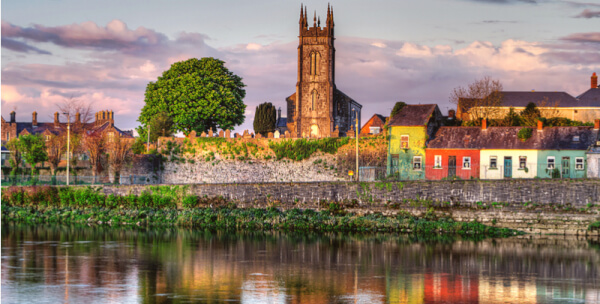RSU tax in Ireland: What you need to know
Find out everything you need to know about Ireland RSU tax here in our essential guide, including current tax rates.

Have your heart set on living in Ireland for your retirement? It’s a popular choice for UK expats, with more than 100,000¹ of them living in Ireland according to the 2016 census. It’s easy to see why, as the UK’s closest neighbour has beautiful scenery, friendly people and a shared language.
If you’re dreaming of retiring to Ireland, read on. We’ve put together a handy guide covering everything you need to know ahead of your big move, from money and visas to healthcare and buying property.
We’ll also include a little info on how best to manage your money, especially when sending and receiving payments across borders. Open a Wise multi-currency account and you can send money between Ireland and the UK for tiny fees and the real, mid-market exchange rate. You can even avoid high bank fees when receiving your UK pension, all from your secure Wise account.
But more on this later. Let’s start with a few of the many reasons you may want to retire to Ireland.
So, why is Ireland such a popular choice for UK retirees? Let’s take a look at a few of the most persuasive reasons to spend your post-work years there:
Ireland is well connected. Living there, you’ll find it quick, easy and cheap to fly or ferry back to the UK to see friends and family. Ireland also enjoys excellent transport links to Europe, where flights connect to the rest of the world. So, you’ll never feel cut off, even if you choose a rural part of the country.
Quality of life. Many UK expats move to Ireland after enjoying many happy holidays there, walking in gorgeous green countryside, exploring the culture and history of its vibrant cities and of course, enjoying a pint in its world-famous pubs. If you love a buzzing social scene, Ireland is for you.
Beautiful natural scenery. Ireland isn’t known as the Emerald Isle for nothing. It’s a lush, green island bursting with incredible sights, from towering cliffs and rugged coastline to lakes, sheep-dotted mountains and scenic walking routes. And of course, there are UNESCO World Heritage Sites and fascinating historic cities like Dublin to explore.
Excellent public healthcare system. Ireland’s public healthcare system consistently scores highly in global rankings, which is reassuring for retirees concerned about leaving the NHS. In fact, it was ranked 13th in the world² (many places ahead of the UK) by medical journal The Lancet in a 2017 report.
Now, with the whole of this beautiful country to choose, where exactly in Ireland should you spend your post-work years? Let’s take a look at a few of the most popular spots for UK retirees:

If you’re used to city living, Dublin will offer you all the culture, nightlife, food and drink you could ask for. It’s often known as a party city, but there’s so much more to it - from art, music and international literature festivals to beautiful parks and gardens. But as you might expect, Ireland’s capital is far more expensive to live in than other parts of the country.

If you’re looking for an outdoor lifestyle, with plenty of walking routes to try and stunning beaches perfect for summer sunbathing, the County Cork town of Skibbereen is a great choice. There are always festivals and events happening in the town, which is surrounded by some of the best natural scenery in Ireland.

This beautiful, historic city in the south of Ireland is a popular place to retire. There’s a lot going on here, but the pace of life in Kilkenny is much more laid-back compared to Ireland’s bigger cities. There are characterful buildings to explore, plenty of amenities and as Kilkenny borders multiple counties, it’s very accessible too.

If you’ve been dreaming of escaping to Ireland’s windswept coastline, head to the seaside town of Bray. This pretty town is full of character, but also has all the amenities and shops you could want. Bray is laid-back and beautiful, but just a short drive or train ride from the bustle of Dublin.

This west coast city has a welcoming small town feel, and combines modern urban living with just a touch of traditional charm. Galway has a popular farmers market, independent shops and plenty of arts, sport and other activities to join in with.
Plus, this historic maritime city is perfectly situated for exploring Ireland’s wild side, with the rugged Connemara National Park on its doorstep.
Once you’ve settled on a Irish town or city to retire to, it’s time to start thinking about the practicalities of your big move to a new country.
One of the first things to consider is money. If you’re a UK resident looking to retire in Ireland, cost will always be a consideration. This is because the cost of living is higher in Ireland than the UK.
Here are just a few examples of the typical cost of everyday essentials³:
So, as you can see, Ireland can be more expensive than the UK when it comes to the cost of living. This is especially the case when it comes to things like accommodation and transport, which is particularly high in Ireland’s major cities.
You’ll need to factor in these increased costs when planning your retirement finances, making sure you have enough to live on along with a comfortable savings cushion.
We’ve covered money, but there are a few other key things you’ll need to know before retiring in Ireland:
Pensions. You can apply to receive your UK state pension in Ireland once you move. Plus, you may also be able to transfer other personal and workplace pensions over to your new country of residence. You’ll need to check that your Irish pension scheme is a qualifying recognised pension scheme (QROPS), otherwise you could face a large tax bill. It’s a good idea to get expert pensions advice before you do this.
Property. Housing in Ireland can be more expensive than you’re used to. But the good news is that you won’t face any restrictions as a non-Irish citizen when it comes to buying property or land, or renting accommodation.
Healthcare⁴. UK citizens can access the Irish public healthcare system, even after Brexit thanks to the Common Travel Area (CTA) agreement. You may be able to access some services for free, if you qualify for a medical card on income grounds. Otherwise, you may need to pay a fee to access healthcare on the same grounds as an Irish citizen. Alternatively, you can take out private health insurance.
Driving licences⁴. If you have a UK driving licence and want to drive once you move to Ireland, you will need to exchange it for an Irish driving licence. Visitors can use their existing UK licence, but residents will need to follow the process for converting it to an Irish driving licence.
One of the most attractive reasons to retire in Ireland for UK citizens is that you don’t need a visa.
UK citizens can live, work and study in Ireland without the need for any kind of visa or residency permit⁴. While the UK leaving the European Union has triggered the need for retirement visas in many other EU countries, Ireland has a Common Travel Area (CTA) agreement with the UK.
So, that’s one less thing to include on your to-do list!
Without the need to apply for any kind of Ireland retirement visa, moving there as a retiree should be relatively straightforward. However, remember that moving to a new country will always have its costs and complications.
Follow these steps to kickstart your move:
Check that your UK passport is valid for travel, with at least 6 months validity remaining. You may not need a visa to retire in Ireland, but you do need a valid travel document.
Choose where you want to live in Ireland. You may need to make several trips over there to get a feel for the place and scout out properties to rent or buy.
Arrange for your furniture and belongings to be shipped over. Get a few different quotes for shipping, and make sure to check all the customs taxes, costs and rules beforehand.
Arrange to claim your UK pension in Ireland. You can start your claim with the International Pension Centre here.
Arrange to convert your UK driving licence to an Irish driving licence. Visit the National Driver Licence Service website for details on how to do this.
Find out if you’re eligible for free healthcare in Ireland with a medical card. The Citizens Information website is an excellent place to start.
Open an Irish bank account. This isn’t absolutely essential, but it could make everyday expenses such as rent and food shopping much easier. However, a bank account almost certainly won’t be the cheapest option for payments that cross borders, such as receiving your UK pension. But don’t worry - we’ll look at a cheaper alternative next.
As you’re planning the big move, you’ll have lots of different costs to cover. For example, you’ll have shipping costs to pay for all your furniture, along with rental deposits or estate agent fees. There’ll be a lot of payments whizzing back and forth between the UK and Ireland.
If you send money to Ireland using your bank, you could get stung by high international transfer and currency conversion fees - as Ireland uses the Euro. Banks also tend to add a mark-up to the exchange rate, which further eats into your money.
But open a multi-currency account with Wise and you can send money to Ireland and all over the world for low fees and the real, mid-market exchange rate. It’s also handy for things like receiving your UK pension in Ireland, allowing you to avoid fees and poor exchange rates - so that you can make the most of your retirement income.
Plus, you can spend in Euro from the moment you arrive in Ireland using the contactless debit card available with your Wise account. This clever card automatically converts GBP to EUR (or whatever the local currency is, as it works in 150+ countries) at the fairest rate when you spend, for just a small conversion fee. So, you can cross a trip to the bureau de change off your to-do list.
Wise keeps your money protected, so you know that every penny of your hard-earned retirement money is safe.
After reading this guide, you should have all the essential info you need to plan a blissful retirement in beautiful Ireland. Just make sure to plan your budget carefully before you move, and seek financial or pensions advice if you need it. Good luck and enjoy your retirement!
Sources used for this article:
Sources checked on 29-April-2021.
*Please see terms of use and product availability for your region or visit Wise fees and pricing for the most up to date pricing and fee information.
This publication is provided for general information purposes and does not constitute legal, tax or other professional advice from Wise Payments Limited or its subsidiaries and its affiliates, and it is not intended as a substitute for obtaining advice from a financial advisor or any other professional.
We make no representations, warranties or guarantees, whether expressed or implied, that the content in the publication is accurate, complete or up to date.

Find out everything you need to know about Ireland RSU tax here in our essential guide, including current tax rates.

Need to call a friend in Ireland? You might be checking in with a relative who lives there, or perhaps ringing an Irish business about an order. Whichever is...

Your essential guide to importing a car from Ireland to the UK, covering the costs, documents and procedures to follow.

Travelling or moving to the Emerald Isle? You may be wondering how you can order your bits and pieces online directly to your doorstep. As an expat or even...

A full guide on how to get an Irish citizenship, including routes to citizenship, fees and processing times.

Everything you need to know about moving to Ireland from the UK. Read about visas, property, healthcare, cost of living and more.